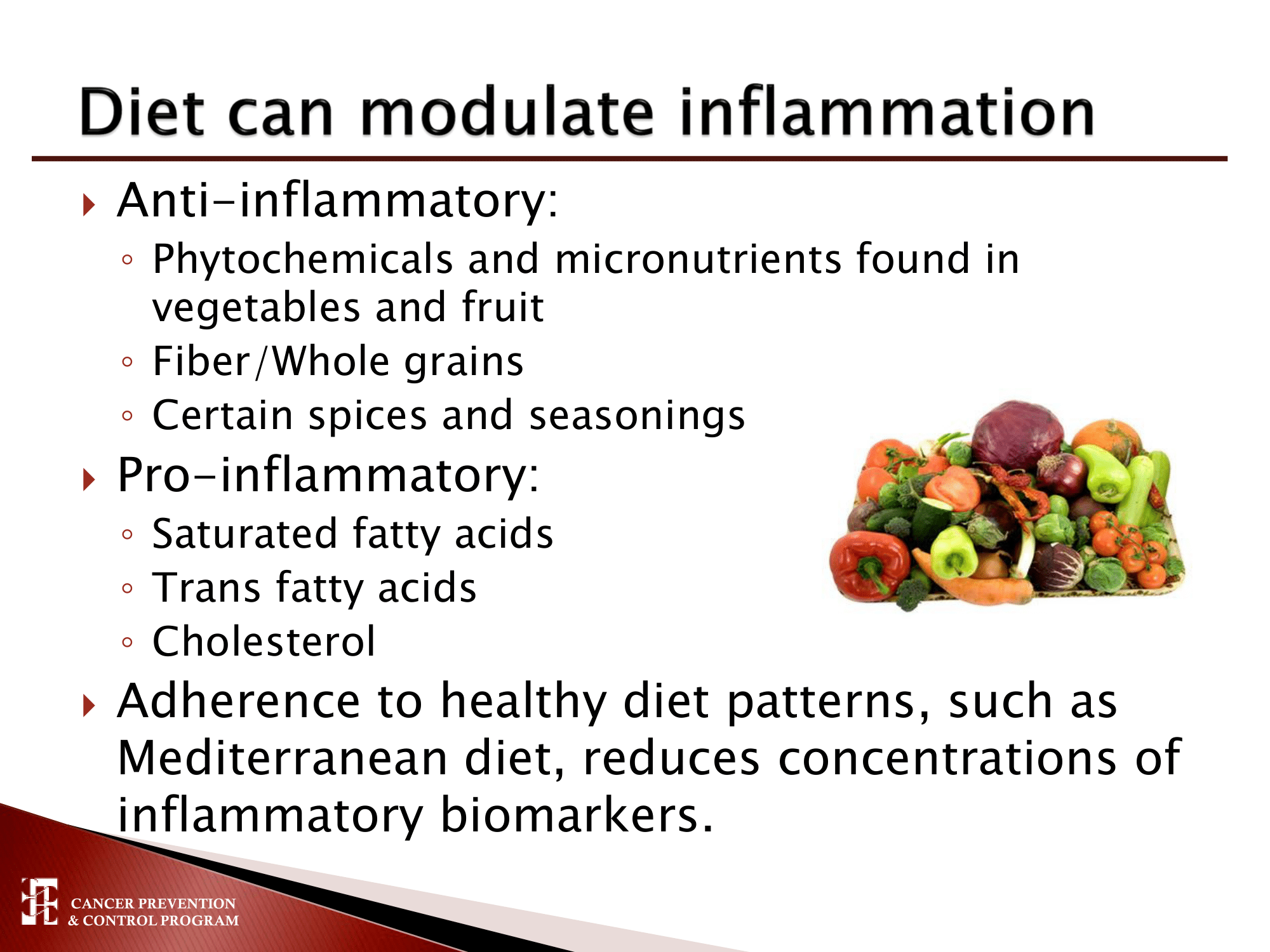Slide Deck for DII (Dietary Inflammatory Index) presentation (2014) is a pretty good overview - it describes their methodology. Slide 4 is insightful:
What are pro-inflammatory foods? The slide says: "saturated fats, trans fats & dietary cholesterol".
- Where are saturated fats found? All animal products (meat, fish, eggs, dairy) have saturated fats. In contrast, only a handful of plants like coconut and palm have significant amounts of saturated fats; other plant foods have zero or tiny amounts of saturated fats.
- Where are trans fats found? Only in animal products and processed plant foods. Whole plant foods (unprocessed) have almost zero trans fats.
- Where is dietary cholesterol found? Exclusively in animal products. Plant foods have zero cholesterol.
What are anti-inflammatory foods?
- Phytochemicals and micronutrients found in vegetables & fruits [so we must eat fruits & veggies in abundance]
- Fiber / Whole Grains [fiber is found exclusively in plant foods; animal foods (meat, fish, eggs, dairy) have zero fiber. Additionally, extracts like oils (fat extracts) and sugars (carbohydrate extracts) have zero fiber. Also, processed foods are invariably low fiber, with fiber disrupted).
- Certain spices & seasonings. [Plant foods]
So basically, what are they saying? Plant foods are anti-inflammatory (if we remove processed foods and those special plants high in saturated fats (like coconut & palm) from our food plates). Animal foods are pro-inflammatory!
… so how may we use the guidelines on pro-inflammatory and anti-inflammatory foods to construct our food plates? Slide 4 mentions the Mediterranean Diet — such a diet improves upon Standard American Diet by amplifying plant foods and reducing animal foods & processed foods. But as a scientist or an engineer, we can employ the rational part of our mind and ask, "why would I want to eat even a little bit of any food that is pro-inflammatory? why don't I eat only anti-inflammatory foods?" In other words, "why don't I dial the knobs of healthy eating all the way to unprocessed plant foods, that is, a Whole Food Plant-Based diet?"
Let's keep in mind that inflammation is not a linear function of the quantity of inflammatory foods we consume. In other words, even SMALL amounts of pro-inflammatory foods may trigger BIG inflammatory responses in our body. This situation is like food allergies — a tiny amount of an allergic foods like nuts may trigger a big response in our body if we have a nut allergy. Keeping this in mind, why would we want to consume even tiny amounts of pro-inflammatory foods at all?
Also, let's remember that our immune system weakens under times of stress, or lack of sleep, or an infection, or an accident. Such events are part and parcel of the human experience: we experience ups and downs — the vicissitudes of daily life. When we're down, we're more susceptible to illnesses. In our moments of vulnerability, why should we challenge our body with even 1 oz of any pro-inflammatory food?
Summary: The DII (Dietary Inflammatory Index) points at a Whole Food Plant-Based diet as the most anti-inflammatory diet.
How to construct anti-inflammatory food plates? In Dietary Inflammatory Index: A Powerful New Tool (3 mins, 2018), Dr James Herbert (the creator of Dietary Inflammatory Index) explains:
Excerpts from YouTube video description:
At offset 11:05 of this Q&A session, Dr Greger underscores the point that WFPB diet is the most anti-inflammatory!
What Is An Anti-Inflammatory Diet? (61 mins, 2021) is a good presentation that explains the role of inflammation in our body and the DII (Dietary Inflammatory Index) which was designed to identify foods which promote inflammation and foods that help us reduce inflammation.
First, she summarizes the broad conclusions of DII: (a) pro-inflammatory foods are animal foods, processed foods and some plant foods high in saturated fats (like coconut and palm), (b) anti-inflammatory foods are unprocessed plant foods. Awesome!
Next comes this question: how may we assemble food plates based on the above insights derived from DII (Dietary Inflammatory Index)? She shows example food pyramids in which unprocessed plant foods have been amplified and animal foods & processed foods have been reduced — but she doesn't say that we must dial these knobs all the way to make animal processed foods & processed foods zero — she says that it's okay if we eat 2oz of red meat in a week or a processed hamburger once a month.
On the whole, a good presentation showcasing the science underlying DII that helps us identify pro-inflammatory and anti-inflammatory foods[ but failing to take a strong stance by asking this question: "why should we eat any amounts of pro-inflammatory foods at all?"
It's amusing to see that most audiences (and many scientists) are resistant to the message that a Whole Food Plant-Based is the most anti-inflammatory even when the science underlying DII is pointing towards it!
Another caveat in the presentation is centered around alcohol: Major organizations like AICR, ACS, ECAC, AHA clearly say, "Don't start drinking alcohol if you don't already drink. If you insist on drinking, limit alcohol intake". The presenter fails to remind us that we must not drink alcohol at all, if possible.

 Instagram
Instagram YouTube
YouTube